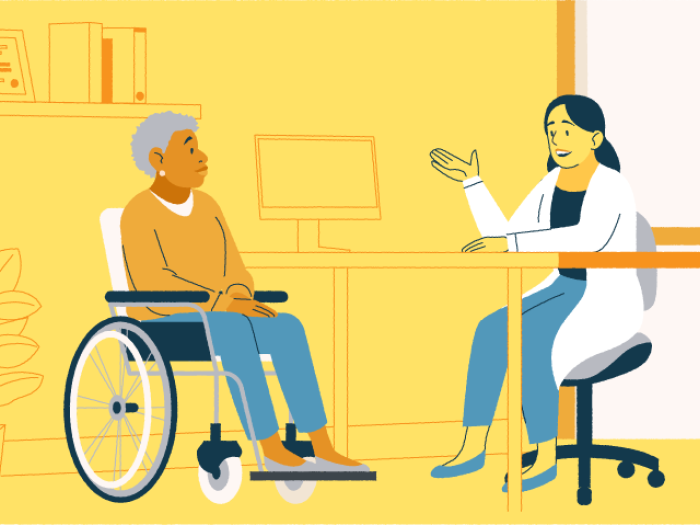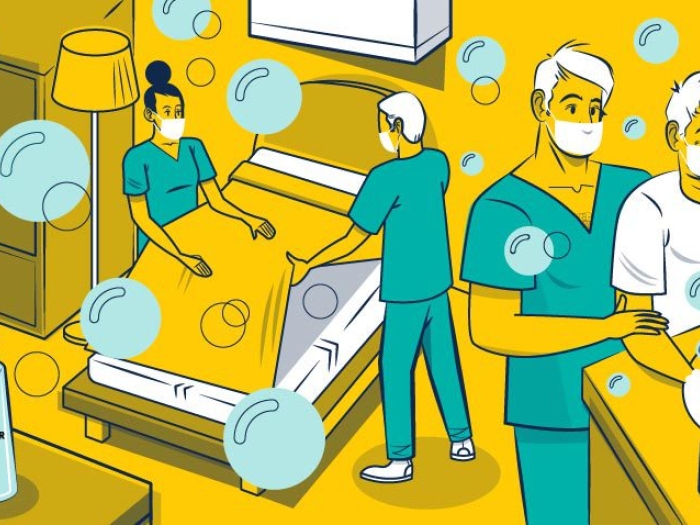Hospitals now have to tell you the price of their care — but that’s very different from what your cost will be.
7:00 AM
Author |

You're at the supermarket, and you decide to pick up a can of soup. How much will it cost? The price is right on the shelf, or a sticker on the can. Maybe there's a sale on your favorite brand, marked on a yellow sign. Or maybe your frequent-shopper card will save you a buck.
Buying a car? You'll see an official "sticker price" on the window, though if you haggle with the salesperson you might pay less. Maybe she'll throw in a few "free" oil changes too.
LISTEN UP: Add the new Michigan Medicine News Break to your Alexa-enabled device, or subscribe to our daily audio updates on iTunes, Google Play and Stitcher.
But when you go to the doctor's office, the emergency room or the hospital, you don't expect price tags, yellow sale signs or freebies. (You might see a sign about paying your copay before you leave.)
Now, new laws and programs are making it easier to see some health care price information on the internet — if you know where to look. Just this month, hospitals had to post service prices online.
Sticker shock
Even so, most people only find out the cost of their health care weeks after they received it, when a bill arrives in the mail saying what their insurance company paid for their care — and what they still owe out of pocket. The arrival of that bill can bring on a serious case of sticker shock.
What can you do to avoid such surprises? Here's some advice from two University of Michigan doctors who study health care prices and how patients behave when paying out of their own pockets.
According to Jeffrey Kullgren, M.D., MPH, M.S., the first thing to understand is that the price for a service — say, an MRI scan or a knee replacement — can vary widely depending on where you go. The same is true for prescription drugs.
SEE ALSO: Want to Save on Prescription or Over-the-Counter Drugs? Speak Up
"Even when they should be standardized, we find that prices can be hundreds or thousands of dollars apart at two facilities," says Kullgren, an assistant professor of general medicine and a health care researcher. "So getting price information up front for nonurgent services can save patients money."
This is especially true, he wrote in Harvard Business Review, because more people now have insurance plans that require them to pay for part of their care through deductibles and coinsurance. And 1 in 9 people still lack health insurance completely.
Four key steps
He offers four key steps to take:
-
Plan ahead: Ask your provider to forecast what health care services you will need in the next year. Talk to your insurance company (if you have one) about what costs you're responsible for, for instance how large your deductible is. Then, look for price information online, or call potential providers and your insurance company to estimate the costs of these services, so you can save to pay for them.
-
Shop around: When your doctor or another provider tells you that you need a scan, a procedure or some other service, check whether you could get it done at other nearby facilities at a lower cost with your insurance. Compare prices by using online tools or contacting facilities directly. If you find a lower price, ask your insurance company if the care would be covered at that facility — the last thing you want is to pick an out-of-network facility and pay more than if you went to an in-network facility.
-
Don't be shy: Don't assume that your doctor or other provider knows your insurance situation or your financial situation. Tell them if you have a deductible for your care and whether you have met the deductible. Together, you can consider cost when making decisions about your health care.
-
Haggle: Just like at the car dealership, people who are facing a large out-of-pocket cost may find that health care facilities might accept a lower amount if asked directly. You might be pleasantly surprised, says Kullgren — particularly if you can justify your lower offer with a quote from another facility nearby. His research has found that more than half of people who try to negotiate a price for a service are able to pay less. If your income is under a certain limit, you might also qualify for a percentage discount.
-
What else can you do to avoid health care bill surprises? And how can you keep fear of unknown bills or steep out-of-pocket costs from getting in the way of the care you need the most?
MORE FROM MICHIGAN: Sign up for our weekly newsletter
Mark Fendrick, M.D., director of the U-M Center for Value-Based Insurance Design, says the new price transparency law for hospitals is a step in the right direction. But he says the data most hospitals have posted are like the "rack rate" for a hotel room — very few people pay the list price.
"I'm worried that someone will go online and see a price for a service and think it's too high and forgo care that they need," says Fendrick, also a general internal medicine physician at U-M. "Or they may go to a place that seems less expensive, find out it's out of their insurance company's network and pay significantly more, or find out that the online prices didn't include other required costs like an anesthesiologist or post-surgery rehabilitation."
Fendrick's advice:
-
Understand your health insurance: Contact your health plan and ask for specific information on your level of coverage for particular services. Keep in mind that the Affordable Care Act requires most insurers to fully cover many preventive care services, even before your deductible is met.
-
Check prescription drug alternatives: Ask your clinician if there is a generic alternative to a name-brand drug. Look on state-run sites such as michigandrugprices.com for prices of common drugs at different pharmacies. Ask for a prescription for a three-month supply if you take a medication regularly.
-
Use the ER wisely: Avoid the emergency room for nonserious medical situations. Keep in mind that even if the hospital whose ER you want to go to is in-network, the doctors there might not be, even though they only see patients there. It's best to know ahead of time which ERs have in-network doctors for your plan, so you can make a decision when an emergency strikes.
-
Speak up: If you get a surprise bill, don't just take it at face value. Call your insurer and the place where you got care. Talk to them about what is on the bill and what you can do to bring down your share of the cost. If nothing else, they may be able to set up an interest-free payment plan so you can pay a portion each month instead of having to come up with the full amount at once.
Health care prices may never be exactly like soup prices, hotel room rates or even car prices, say Kullgren and Fendrick, who are both members of U-M's Institute for Healthcare Policy and Innovation. There's too much variation between patients and providers to make it possible to list an up-front price for many services, especially with Americans having such a wide range of insurance types and plans.
But as government agencies and legislators, consumer groups and health care professional societies all move toward greater price transparency, it may get easier for patients and their families to avoid the worst surprises.

Explore a variety of healthcare news & stories by visiting the Health Lab home page for more articles.

Department of Communication at Michigan Medicine
Want top health & research news weekly? Sign up for Health Lab’s newsletters today!





